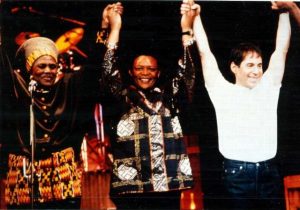
Listening to the track “I Know What I Know,” I was struck by the positioning of the Zulu and English vocals. This was the first track on the album that credited collaborating South African artists; in fact, the song itself was based on existing music by M.D. Shirring and the Gaza Sisters, which Simon then altered for the album. However, despite the South African musicians predominant role in writing the song, Simon’s English vocals overpower the Zulu backing chorus. This creates a hierarchy of voices, in which Simon exists as the “star,” both as the White singer and the White songwriter. I wonder if this can be read in terms of the “refinement” or “civilizing” which Meintjes notes was imposed on other traditional South African instrumentation, such as the pennywhistle (55). I wonder too if Simon’s album is as politically ambiguous as Meintjes makes it out to be; here, the hierarchy of vocals (and thus, language and race) suggest an implicit message of Western non-indigenous supremacy.

In relation to the point you’ve brought up here, it also seems that Simon’s ideas about musical collaboration and race within the United States might mirror the very same concepts present in White South African responses to Graceland, particularly concerning the “white search for roots.” (51). In her article, Meintjes argues that the reason for the lack of credit to the Zydeco group Good Rockin’ Dopsie relates to “the prioritizing of the text over the music… Simon contributes to the lyrics of ‘Homeless’ and therefore shares credits with Shabalala, whereas Good Rockin’ Dopsie does not contribute to the lyrics of ‘That Was Your Mother’ and is therefore not credited as coauthor” (48). I, however, find this argument unsatisfying. Earlier in this paragraph the author mentions a separate paper by Steven Feld, in which he suggests “that an answer to this lies in the more overt otherness of the African musicians’ contribution than of the American minorities. The Africans’ otherness marks their input much more clearly as their own” (48). If this statement holds true, it perhaps provides an answer to you final statement, in that, yes, Simon’s album “suggest[s] an implicit message of Western non-indigenous supremacy.” by its preoccupation with of “civilizing” its South African source material, and ignoring the racial differences between his “American” musical elements. Concerning “That Was Your Mother,” Simon can easily claim the song as his own without crediting its original composer (who, according to AllMusic, is actually Clifton Chenier, another famous Zydeco musician referenced multiple times in the song as music Simon dances to) by employing a national, rather than racial claim, to all “American” music, in the same way that White South Africans claimed Black music as a part of their national identity.